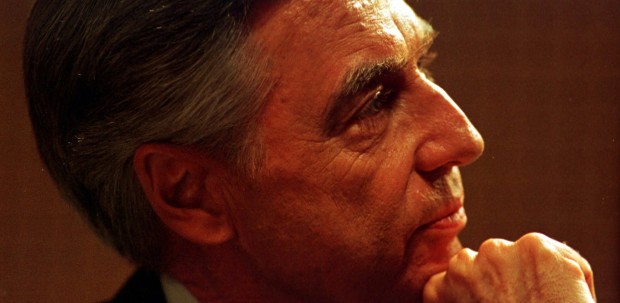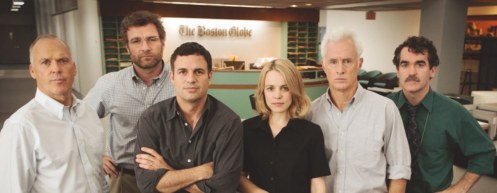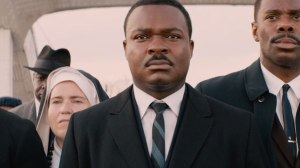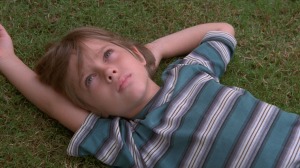In the last remaining hours before this year’s Academy Awards, I’ve given a lot of thought, as I always do, about all of this past year’s most-acclaimed films as a whole. Collectively, is there a certain theme that runs though them all? When cinema studies students of the future (like I used to be) study this year’s films and dissect them, debate them and rate them – how will they be measured?
Then, as it is now, it will probably be difficult to look at the films of 2016 without involving the environment from which they’ve emerged. It’s an environment where politics and culture have seemingly become conjoined and inseparable – in our conversations, our daily feed, and all throughout our entertainment spectrum. As a nation, we are seemingly defined much more by our ever-deepening divisions than we are our bonds and similarities.
Whether you view films or the act of movie-going / watching as art or entertainment (or a little bit of both) – one thing is universally certain…films are supposed to create some kind of common ground for us all, they are often the spark that allows complex conversations that would otherwise seem so impossible – to begin. They help us find it within ourselves to slip into the shoes of someone that is either so much like us, or someone we’ve perceived so different – even if it’s only for a couple of hours. No matter the character, we suddenly can see things about our truest nature reflected back to us. Suddenly our own life experiences transcend beyond the screen, giving us a deeper and better understanding of ourselves. Or on the opposite end of the spectrum, a film can bring to light something we may not have known about, an experience of even a fictional character that could cause us to look at the people around us or even the world in a different light. Some of this year’s films reflect and explore these deep divisions, helping us to better understand all sides of the great equation – while others present hopeful solutions for mending these divisions and growing stronger at the broken places.
In as divisive and tumultuous times as we are currently living, we all have certain ideas or outlets we look to for clarity, inspiration, and perspective. My go-to is now as it has been on and off for the past 7 years – the works and ideas of mythologist Joseph Campbell (big surprise, I know). In the midst of watching the series “The Power of Myth” I’m reminded of his views on the role of all artists. He says…
“The role of the artist I now understood as that of revealing through the world-surfaces the implicit forms of the soul, and the great agent to assist the artist was the myth.”
Campbell believed in the collective creation of myths (on a subconscious level) to explain that which could not be explained – the mysteries of existence and our very human essence. Just before his death in the mid-1980s he talked a great deal about the role that artists would play in the years ahead, as a new world was emerging – one we are deeply entrenched in now.
This year’s best films, in my opinion, have held the mirror up to us and challenged us to take a long, hard look – at our past, at our current times, and deeply at ourselves – emboldening us to take responsibility for defining what kind of world lies ahead. Here are my favorite films of 2016…
****PLEASE NOTE – SPOILERS AHEAD****
#10.) Moonlight: Barry Jenkins’ coming-of-age drama is unlike any other, focusing in on a shy, withdrawn black boy named Chiron – living in Miami with his mother (Naomie Harris) – an erratic, abusive, drug addict. Chiron comes under the wing of a local drug dealer Juan (played with such patience and thoughtful precision by Mahershala Ali) who serves as more than a father figure to the boy. Act one of this film is gripping and heartbreaking – as Chiron struggles to come to terms with his own sexuality, amidst other challenges. When Chiron asks Juan what a “faggot” is and if he is one, watching this man quickly process the importance of his own response and respond so gracefully is unforgettable. Act two of the film shows Chiron as a lanky, soft-spoken teenager, now without Juan for protection or guidance – he’s left to fend for himself against his own mother and the incessant bullying waiting for him in and outside of High School. Pushed to the very edge, he chooses violence – forever altering the man he’ll become. The third act of the film was for me, the weakest (which is why this film isn’t higher on my list) but in it we see Chiron fully embracing a man he isn’t, and denying who he really is. When he returns home to reconnect with a lifelong friend and lover Kevin he seems to finally realize the truth behind all the lessons Juan had taught him as a boy. Juan was a man who as a drug dealer and gangster was living a life that wasn’t him. Many years earlier he had encouraged Chiron that he and he alone would someday have to decide on the man he wanted to be. In the final minutes of Moonlight Chiron finally makes his choice, culminating in a film that allows Jenkins to smoothly navigate difficult themes such as drug addiction, poverty, bullying and homophobia – an even uglier experience for black teenagers coming to terms with and discovering confidence in their sexuality.

Oscar-nominee Mahershala Ali in “Moonlight”
9.) Before the Flood: Fisher Stevens’ (yes, THAT Fisher Stevens…the guy from Short Circuit) climate change documentary puts all-world actor Leonardo DiCaprio (recognized as a United Nations’ Messenger of Peace) at the center of the climate change debate in a jarring film that somewhat consciously takes on the role of sequel to former Vice President Al Gore’s 2006 documentary An Inconvenient Truth. The film follows DiCaprio around the globe as he meets with leading scientists, diplomats and even The Pope who all share grim opinions on the Earth’s prospects if we do not reverse course on many of our environmental policies and practices. The weak link in the film is ironically DiCaprio who often asks paper-thin, softball questions to experts who are in almost all cases very passionate about getting their points-of-views across. At its most upsetting (and revelatory) the film shows us aerial footage of fossil fuel extraction and deforestation. A scorched, gauged, and disfigured landscape that looks like something out of a post-apocalyptic sci-fi movie – not our current, collective home. While Before the Flood continually embraces shock value, there is a pervasive sense of hope and optimism laced throughout. The film presents clear solutions for reversing the damage that don’t seem that impossible. As the film not so subtly reminds us, it’s up to us on where we want to go from here…as a species.
8.) Jackie: Ahh, the year of non-linear storytelling….
In Jackie, this device may be most effective for ushering the audience around a narrative they’re already very familiar with – the assassination of President John F. Kennedy in Dallas, in 1963. But this film takes a road-less traveled, by working through the experience of the tragic first lady (played by an absolutely fearless and committed Natalie Portman) in a raw, macro-emotional way. Much like it’s real-life heroine, and its lead’s performance the film takes-on the depiction of a larger-than-life icon courageously by getting inside her mind as we jump back and forth from the day of and days around the death of her husband and her meeting with a prodding journalist (Billy Crudup). Portman owns the role – reminding us not only how skilled of an actress she is, but how in many ways she may still just be scratching the surface of her talent. Her performance is draining, (dual thanks to the meticulous direction of Pablo Larrain) and you feel all of the devastation and confusion as she tries to hold her family, her own psyche and in many ways the entire country together in the wake of the assassination. But just when you feel like she doesn’t have anything left, she picks herself up and courageously moves forward. The film positions her as the main driver behind a very public and exposed funeral that she believed the country needed to begin mending their wounds and find closure. The most surprising aspect of Jackie is when it moves away from historical dramatization and explores the questions this woman may have asked about God, existence and the fate of her own soul. It happens seamlessly – thanks to Portman, who for 2 hours brings Jackie Kennedy back to life before our very eyes and in a way that honors her as a strong, intelligent, and compassionate woman that gives us all a worthy embodiment of patriotism and courage.
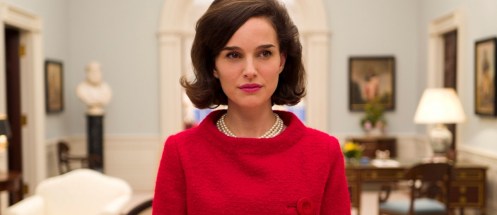
Oscar-nominee Natalie Portman portrays first lady Jackie Kennedy in “Jackie”
7.) Loving: Mildred and Richard Loving (played by Ruth Negga and Joel Edgerton respectively) were a real-life couple that fell in love in Virginia in the 1950s. Like most couples in love, they decided that they wanted to get married. Unfortunately Mildred is black and Richard is white and in 1950s Virginia they’re not allowed to get married. So they drive to Washington, D.C. where it’s legal to get married as an interracial couple – problem solved, right? Well the state of Virginia says, “not so fast,” giving them an ultimatum, move out of Virginia or go to jail, all after a barrage of harassment and intimidation. So Mildred and Richard obey and move to D.C. where they have 3 children and go-on with their lives. But so far from their families, especially Mildred’s who doesn’t have the money to relocate – they yearn to return home where Richard’s purchased a piece of land he had always planned to build their house on. Ultimately, Mildred and Richard’s case is taken all the way to the U.S. Supreme Court in a landmark case that is actually the model legislation for the Court’s recent Same Sex Marriage decision. What makes Loving so sweet and powerful is that it never strays far from this couple, who’s relationship seems so effortless, intimate, and real. Both leads are strong and genuine in understated roles – but it’s Negga that really shines. Tonight, La La Land will probably walk away with Oscar gold, and will be touted by many as a “love story,” but Loving is really this year’s best love story – pure and simple – a reminder of how powerful true love can be…so powerful it can change the world.
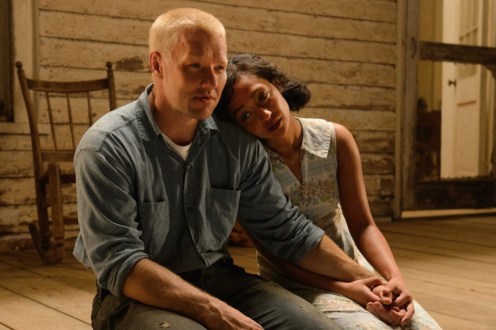
Joel Edgerton and Oscar-nominee Ruth Negga portray Richard and Mildred Loving in “Loving”
6.) 13th: So I was probably a little late to the Ava DuVernay party – not knowing anything about her until 2014. That year, she was involved in two of my favorite films – at the helm of Selma and interviewed in the Roger Ebert biopic Life Itself where she talks about how the iconic film critic used his influence to elevate her first film, I Will Follow. Ebert, as he was often known to do, saw something great in DuVernay – and her latest documentary, 13th would no doubt make Mr. Ebert proud. 13th is an unflinching look at racial tensions tracing back to the era of Jim Crow and how systemic racism remains strong and pervasive in America to this very day, specifically in our criminal justice system. 13th is at its very strongest when it shows the rise in prisoners from one administration to the next and bluntly exposes the private organizations that make billions off of our country’s prison system. Thoroughly upsetting, thought-provoking, and masterfully constructed (the use of iconic/kinetic typography to disseminate statistics is particularly noteworthy) , 13th shows DuVernay at her finest as a documentary filmmaker and a sign of more powerful work from her, still yet to come.
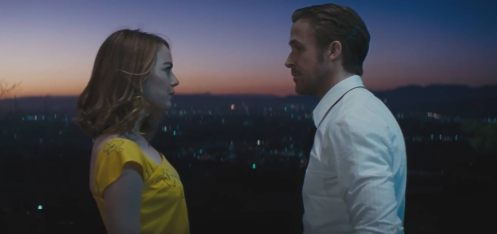
Star-crossed lovers Mia (Emma Stone) and Sebastian (Ryan Gosling) find each other in “La La Land.”
5.) La La Land: With 14 nominations, La La Land has already made Oscar history (tying Titanic and All About Eve). There have been a lot of naysayers that have come out of the woodwork in the last few weeks to knock this awards juggernaut down a few pegs. I’ll say this about all the criticism as to how it relates to the film’s placement on this list. 1.) I saw it in late December before it started to get really hyped, and 2.) I’m not a fan of musicals, often having a viscerally negative reaction to when characters break into song and dance for no reason. But La La Land is NOT your average musical. In the hands of filmmaker Damien Chazelle – this film is in all definitions – a work of art. Emma Stone and Ryan Gosling are strong as the leads, with Stone really doing her best work. As she continually gets rejected (or worse, ignored) as she pursues her dreams we can feel each hit to her confidence as if we were punched in the gut – she’s that good. And Gosling is fast-talking and gregarious as always. His performance in this film is something we’ve seen him do before, for sure, always maintaining a vulnerable / easy-to-root for persona. Someone like Campbell would tell you that we all, no matter who we are, have a “dream” in life and that the pursuit of this dream is the fulfillment of our destiny. Stone’s Mia and Gosling Sebastian both struggle to maintain sight of that dream, especially when life throws them off-course – most of all by falling in love with each other. Alright, enough about Stone and Gosling though because Chazelle’s direction is the real star here. He starts the film off with a huge musical number on an LA freeway that seemingly is ONE shot (maybe there’s a cut in there). From here, he beautifully pays homage to classic musicals past from Singing in the Rain to West Side Story all without missing a beat. Somehow, this musical seems to capture the essence of navigating and surviving the entertainment industry in Los Angeles from the perspective of the “cheap seats.” La La Land manages to make us think about what is sacrificed in pursuit of our dreams, as we have to make hard choices that are always accompanied by regrets and the feeling of “what if?” It’s a lot deeper and contemplative than the film’s critics would lead you to believe.

Academy-Award Winner Denzel Washington directed and stars in “Fences,” based on the award-winning play
4.) Fences: So on the opposite side of the scope spectrum, we have Denzel Washington’s Fences based on the play by August Wilson (also starring Washington and Viola Davis in the lead roles). Washington’s character Troy is a 53-year-old garbage man living in Pittsburgh in the mid 1950s. He lives in his small home with his wife Rose (Davis) and his son Cory (Jovan Adepo). Most of the film, being true to the play, takes place at their home – which is never short on tension. Troy’s past is a complicated one that includes beatings by his father, abandonment by his mother, 15 years in jail for armed robbery, and an unfulfilled career as a major league baseball player because of his skin color. He still talks about the homeruns he hit, and the adulation he received, even though he scoffs when his son encourages him to get a TV so they could watch the World Series together. Cory has a lot of talent like his Dad, with potential as a college football player – but Troy puts up road blocks to his son’s success at every turn, all while lecturing him about responsibility and pride. Dialogue scenes in Fences go on seemingly for 15-20 minutes at times but the performances of Washington and Davis especially are incredible (I’m not exaggerating with my adjective choice here). When tensions reach their highest between these two Davis steals the film with a heartbreaking monologue about the 18 years she’s lost as her bombastic husband’s wife. Troy’s warned by his best friend about screwing up his life, that he doesn’t realize he’s got it pretty good. But Troy’s own insecurity, inferiority and regret takes over – as we watch a man preaching pride push everyone away (or as the film not so subtly infers – “fence” them out). Fences proves less is more when you have great actors and a solid script and a great director (Washington also directed) knows that their best work often comes with the lightest touch.
3.) Lion: It’s just absolutely crazy to me to think that Lion is based on a true story. When / if you see it, you’ll know what I mean. Lion’s all about a little boy in India named Saroo who gets separated from his entire family when he falls asleep on a train that takes him thousands of miles away from home. Being that it’s the mid 1980s, and he’s barely five years old he has no idea about how to get home, nor can anyone help him find it. Luckily for Saroo, an Australian family adopts him and raises him. 20 years later, Saroo (now played by Dev Patel) is a successful young man who has a deep bond with his adoptive mother (Nicole Kidman) and a pretty, down-to-earth girlfriend (Rooney Mara). But even though his life’s pretty good, he’s never been able to move on from the home and family he lost so many years ago. So, he commits himself to finding his mother, brother and sister – fully realizing that without knowing the correct name of his town the chances are slim to none – never mind the fact that even if he DOES find it, the chances are minuscule that his family will still be there. But the film does a wonderful job of showing the effects this separation has on Saroo as he becomes a man – something from him is incomplete – and he finds that this “hole” within him makes it impossible to move forward or find happiness in his life. So if you want to see one movie that will absolutely inspire you this year – THIS is it. Dev Patel reminds us how his desperate, and romantic determination can buoy a story and make its audience’s heart race – hoping that he meets his goal. In the process, Lion reminds us about the ability of absolute strangers to love us unconditionally and root for our happiness, even in our most desperate times of need and despair. Lion will do what few films this year could, reaffirm your belief in people and that miracles can and do happen.
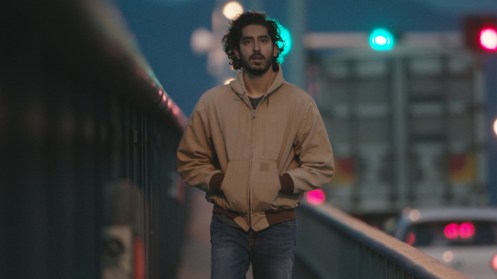
Oscar-nominee Dev Patel plays Saroo, a boy searching for his family in “Lion”
2.) Arrival: Everyone has their own “biggest snub” every year, and if I had to pick one this year it’s Amy Adams. From the opening frame of this film, when Max Richter’s “On the Nature of Daylight” begins to play – this smart, ultra-timely sci-fi film grips you emotionally (strange for the genre) by making it, at its core – a story about a woman and her daughter. I know, you don’t get that from the previews…
It’s a pretty “high concept” plot – about a dozen alien spaceships suddenly arrive at locations across the world and just hover there. But what do they want? Since we have no way of communicating with these beings the United States military enlists the help of an acclaimed linguist Louise Banks (Adams). Communication with the beings isn’t easy – Louise explains that she basically has to create a new baseline language with the beings to even start basic communication. This sort of thing takes time. But the countries of the world are getting anxious since these beings could conceivably wipe out humanity in a second if they wanted. As months pass, Louise makes progress – but in the process seems to be taking her work home with her, including when she’s sleeping – in the form of powerful, somewhat prophetic dreams. It starts to become clear to Louise that these beings can communicate telepathically and Louise is their surrogate translator. But some countries are tired of waiting, and have decided to launch a preemptive attack on these ships, forcing Louise to take extreme measures to stop an unnecessarily world war.
What makes Arrival so special is not the suspenseful, thriller aspects of the story, but instead the ultimate message these aliens have for us about our truest selves and our deeper destiny. By making the story intimate and focused on only Louise Arrival manages to clearly articulate the deeper mysteries of our existence, much more effectively than 2014’s Interstellar did a few years ago. It’s a must-see that’ll make you think very deeply about who we are, what lies unlocked within, and how we must all work together for our collective future.

Amy Adams talks to aliens in this year’s Oscar-Nominated “Arrival”
1.) O.J.: Made in America: I had a hard time ranking the top 3 this year, but ultimately I decided on # 1 because it was the film I most aggressively persuaded other people to see this year. And for each person that took my suggestion, their response was the same – they’d shake their head with a slight air of astonishment and despondency mixed and say, “unbelievable.” Yup, that’s a good way to describe it.
At almost 8 hours, documentary filmmaker Ezra Edelman’s O.J.: Made in America becomes the longest-ever film to be nominated for an Academy Award. At first I was real skeptical about watching it, feeling it would be sensationalist and true-TV-like – all of the feelings I have when I think back about the actual O.J. Simpson trial/saga of the mid 1990s. And there’s certainly some of that in here – but Ezra’s doc is consciously aware of it and ready to explain how O.J. Simpson’s murder trial marks the origins of so many less-than-attractive qualities that exist in our current click-bait, sensationalist, 24-hour news cycle society. Never mind the fact that this trial indirectly launched the career of the Kardashians.
But Episode # 1 of O.J. starts way before anything having to do with the trial and not where you’d expect. Almost 2 hours is spent on O.J.’s childhood, his Herculean-status at USC where he won the Heisman trophy and his up-and-down NFL career inter-cut with a history of black people and racism in Los Angeles, starting post-World War II. It’s clear from the beginning that Edelman’s ready to roll up his sleeves and get real serious about this and Episode # 2 doesn’t disappoint as he juxtaposes the Rodney King beating / LA Riots with O.J.’s relationship with his second wife – Nicole Brown Simpson. Courtship and bliss quickly turns to control and domestic abuse as Edelman sets the stage for the murder of Nicole and victim Ron Goldman. The remaining 3 episodes take us through the murder, arrest, famous Bronco chase, “Trial-of-the-Century” and the aftermath of Simpson’s life that leads him to serving a 13-year sentence for armed robbery.
It’s hard to see an event and story so exhaustively covered with fresh eyes, but Edelman goes so deep into the trenches of this story and explore all of it’s competing personalities and framing the cultural, racial, and historical impact that it had in such a wide way that it’s impossible to remove yourself from feeling how this tragedy is still with us in so many ways to this day and long after the final verdict. Ultimately, Edelman’s film is not shy about telling you whether or not it thinks O.J. is guilty or not, but that’s besides the point. In its unraveling, we come to realize the ingrained complexity of American racism and how it can be used by either sides of the issue to persuade action. For me, personally, I finished each episode of this series feeling a different emotion – which is remarkable. One night after watching I went to bed fascinated, the next…deeply and unshakably disturbed, the following viscerally angry. For a documentary to have that effect is remarkable in my opinion. The O.J. Simpson trial proved all too well how easy it is for an entire country to get caught up in a tragedy such as this – and unfortunately after watching this documentary, you’ll realize that America in 2017 is not that improved from America in 1995, most especially when it comes to violence against women. Edelman knows how to effectively use Simpson’s story to commentate on so many of these vital issues, and weave them together into a disturbing documentary you’ll never be able to shake free of.

Ezra Edelman’s “O.J.: Made in America” is nominated for Best Documentary
Posted in Pathways to Bliss


